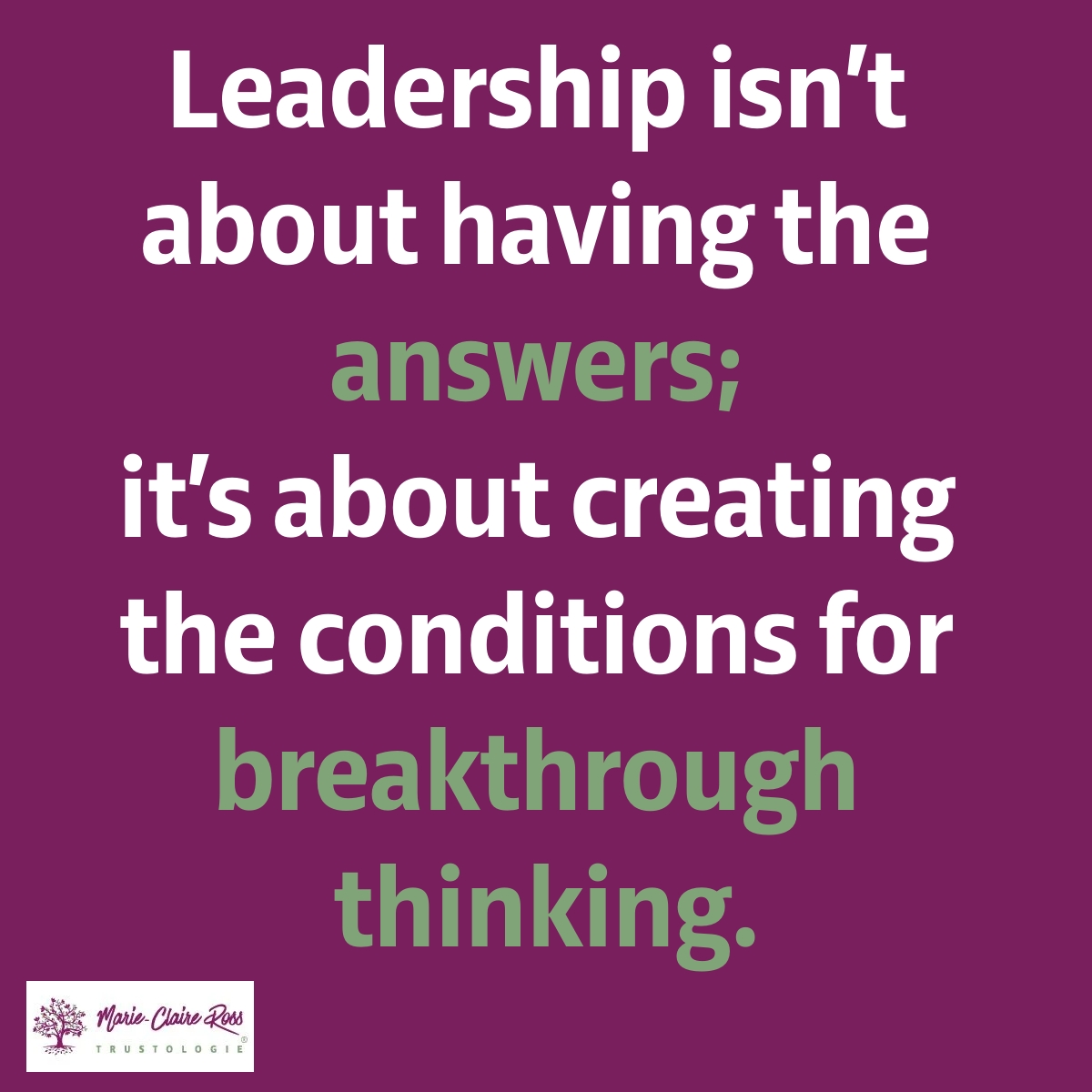8 min read
Beyond the "Why": 5 Coaching Secrets to Unlock Curiosity in Leadership
When my daughter was 17 months old, she discovered a superpower: the word “Why?”For the next two years, it was her response to almost everything.
Develop leaders, strengthen executive teams and gain deep insights with assessments designed to accelerate trust and performance.

Transform how your leaders think and perform with keynotes that spark connection, trust and high-performance cultures.

Explore practical tools, thought-leadership and resources to help you build trusted, high-performing teams.

Trustologie® is a leadership development consultancy founded by Marie-Claire Ross, specialising in helping executives and managers build high-trust, high-performing teams.

3 min read
Marie-Claire Ross : March 1, 2022
.jpg)
As a leader, your job is to create an environment where people work together in service of a shared goal - a high achievement environment where people wake up in the morning excited about going to work, hanging out with others and solving problems together.
Yet, our education system has fooled us into believing that work is all about our technical skills. The reality is technical expertise is no longer enough to stay ahead of the curve.
The seeds of success are communication, co-operation and adaptability. This requires leaders who know how to build trust among team members and with different stakeholders in dynamic conditions. In other words, we need to learn soft skills (which are really hard!)
Today’s ever changing workplace, features increasing speed, complexity and dense interdependencies. Over the last century, work has transitioned from labor intensive, repetitive work to today’s knowledge based economy.
Twenty-first century work is no longer about how many widgets staff produce, but how well they make them together. Our economies thrive through idea generation, partnering and innovation from teams of highly skilled experts. Generating enormous value through cross-selling to clients, as well as developing algorithms, software, intellectual assets and brand value.
Back in 1975, 83% of a company’s value was through tangible assets such as equipment, buildings and inventory. In 2020, intangible assets such as intellectual property and goodwill now make up 90% of a company’s value. This value is only created through leaders who create an environment where people feel supported - freeing up their minds to create - rather than retreat.
I believe that there are three main skills a leader needs to focus on.
.jpg?width=2312&name=Interpesonal-skills%20(1).jpg)
Interpersonal skills are the ability to develop and maintain relationships and enlist others. This means being able to communicate clear directives, a compelling vision and to seek feedback from others.
Leaders who are great at interpersonal skills don't try and ram ideas down people's throats. Instead, they customise their interactions and communication with each individual. Understanding that we all process information differently. They take their time to get a message across with those who are risk-averse.
Intrapersonal skills are about how we manage our selves and our self-awareness. These are our internal abilities such as how with deal with challenges, how we take in information and how we process emotions. Out of all of the skills, this is the hardest one to learn. Mainly because it means understanding ourselves - a core part of emotional intelligence.
Technical skills are important. After all, you can't be an accountant who doesn't know what a profit and loss statement means. But as you progress in your career and lead others, these capabilities become less important.
Instinctually, we focus on our technical competencies - the skills we (and others) can see in action. Often, leaders focus on their technical abilities not realising it's their people skills that matter most when they become a leader. Unwittingly, they break trust with others when they fall into micromanaging and perfectionist tendencies. Preferring to do the work themselves than to trust others with it. But they're missing the point of being a leaders.
As a leader, our technical skills are underpinned by both our intrapersonal and interpersonal skills. Our ability to bring people together and do high quality work becomes more important.
Focusing on technical skills alone is like focusing on building the engine of a car but forgetting about how people will drive it and sit it the car.
"As you progress in your career, your relationship with others is more important than your knowledge of the relationship to the data. You have to suppress your ego, let go of having the answer and embrace the relational world. [Leadership] becomes less about having competencies and more about engendering trust."
Stuart Kaplan, Director of Recruiting, Google
Since COVID, employees have reassessed what they want from their jobs. Fewer and fewer people want to work in organisations with unclear communication, leaders who aren't their for their people and who don't value the work that gets done. Leaders who want to lock themselves away doing the technical work because they don't trust their people should no longer be leading.
Job proficiency isn’t enough, you have to be able to work with others.
Strong leaders today are those who bring the best out of their people. It requires a leader who is people focused, rather than process focused. A leader, who learns fast, brings people together through their extensive networks; integrating and aligning the competing priorities and interests of other teams within the overall organisational strategy. A leader who is focused on improving both their interpersonal and intrapersonal skills.
It wasn't that long ago that these skills were considered a weakness. Now, they are the very skills that are making people want to stay in their jobs.
This is taken from Chapter 2, in the book, TRUSTED TO THRIVE: How leaders create connected and accountable teams.

8 min read
When my daughter was 17 months old, she discovered a superpower: the word “Why?”For the next two years, it was her response to almost everything.

11 min read
I have a friend who often finds herself at the mercy of her emotions. Recently, she called me to rehash a confrontation she’d had with a group of...

9 min read
True leadership presence isn’t a performance or a set of charisma hacks; it is the felt experience of who you are being in the room. By cultivating...
.jpg)
Building workplace trust has become more important than ever before.

One of the interesting things I find when it comes to safety is that some safety professionals (some, not all) like to play bad cop when it comes to...

One of the things I like about my job is consulting with safety professionals on how to improve their safety communication. I get to review monthly...